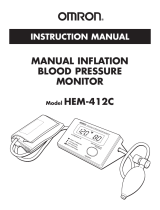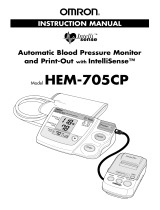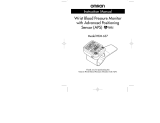
2
INTRODUCTION
Thank you for purchasing the Omron HEM-739 IntelliSense
TM
Automatic
Blood Pressure Monitor. Although your blood pressure uctuates
throughout the day, no self-adjustment is necessary as the monitor
intelligently adjusts to your changing conditions.The IntelliSense
TM
monitor
uses fuzzy logic intelligence to sense both your systolic and diastolic
blood pressure values, and the result is personalized ination with every
reading.Arm discomfort and misreading due to improper cuff ination are
virtually eliminated.
What is Fuzzy Logic?
Fuzzy logic is an exciting new technology that has actually made computers
smarter by allowing computers to think and reason more like people.
Fuzzy logic computers can process information with unclear boundaries
or relative terms rather than a conventional computer that can only
process information with rigid boundaries or absolute terms.For example,
fuzzy logic computers can think in terms of light gray, lukewarm, and
partially true, whereas conventional computers can only recognize black
or white, hot or cold, and true or false, but nothing in between.The result
is smart, user-friendly products and systems.
Your new HEM-739 uses the oscillometric method of blood pressure
measurement.This means the monitor detects your blood’s movement
through your brachial artery and converts the movements into a digital
reading.An oscillometric monitor does not need a stethoscope so the
monitor is simple to use.The HEM-739 is completely automatic.At the
push of a button, the monitor lls the cuff with air and displays your
systolic, diastolic, and pulse measurements on an extra large LCD panel.
You get fast, accurate measurements every time.
Please read this instruction manual thoroughly before using the
Omron HEM-739 IntelliSense
TM
Automatic Blood Pressure Monitor.
For specic information on your own blood pressure,
CONTACT YOUR PHYSICIAN.




























